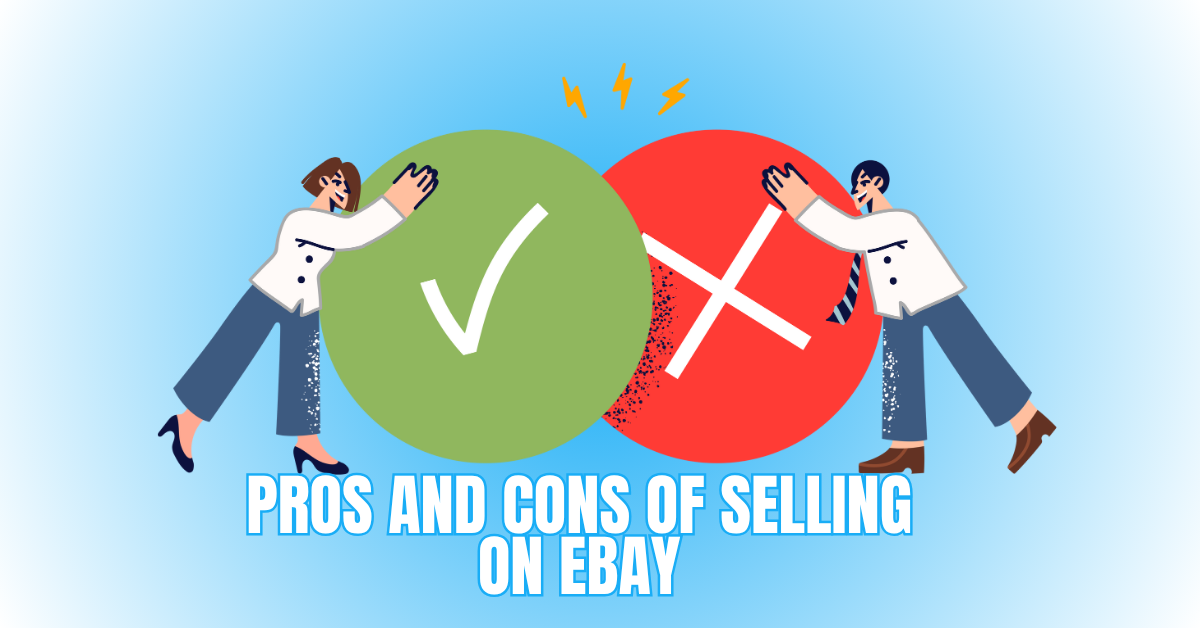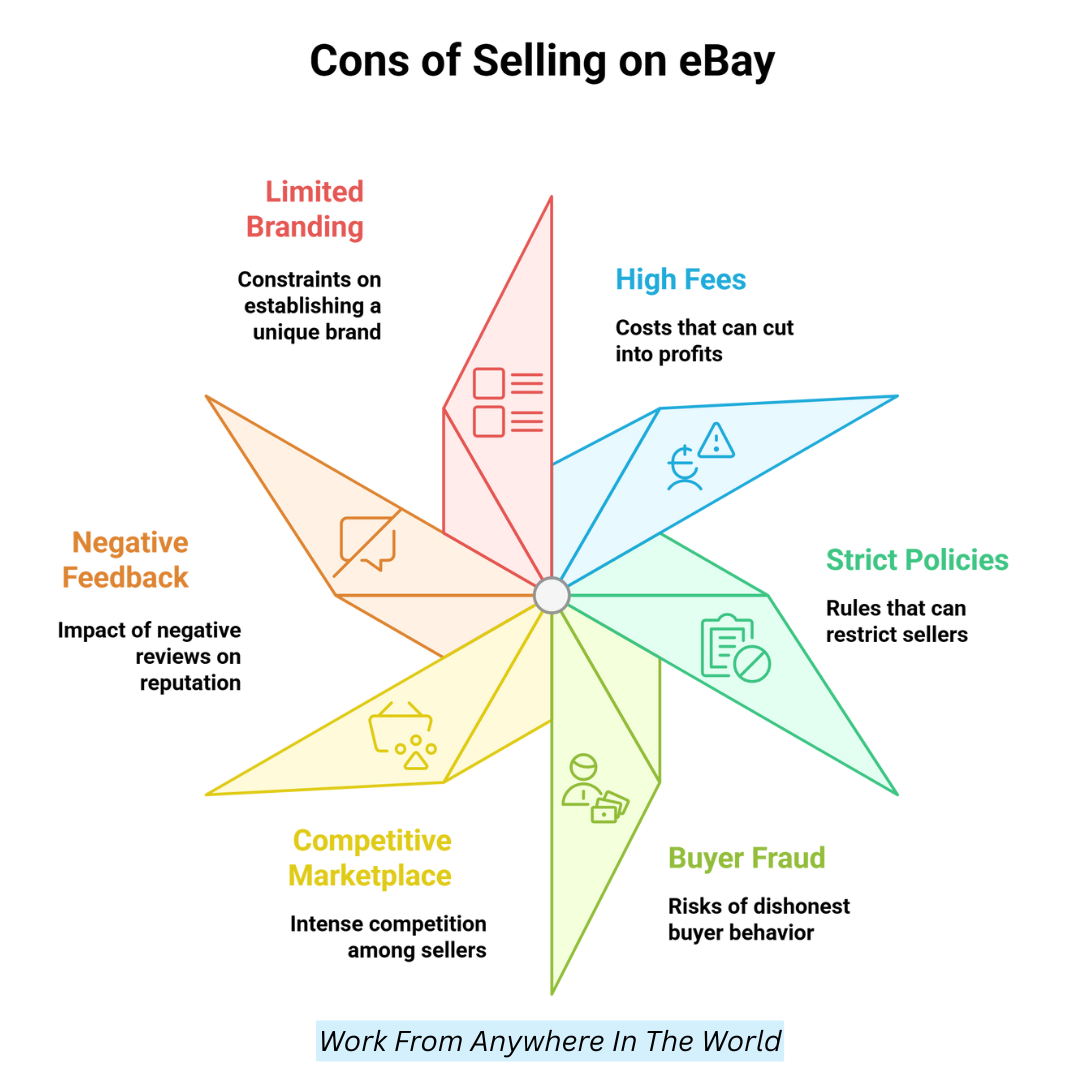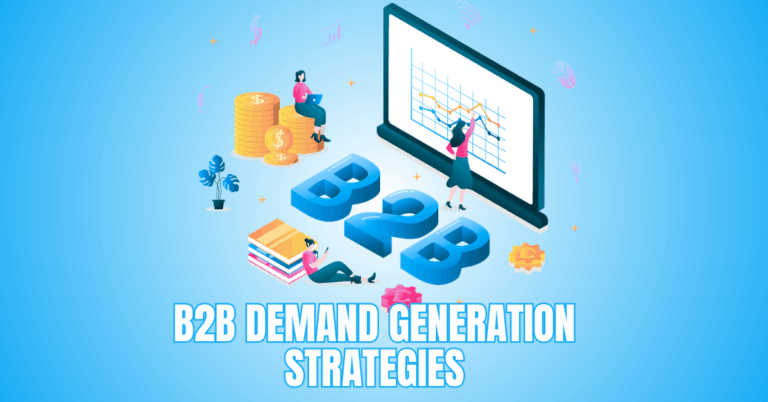Pros And Cons Of Selling On eBay
Selling on eBay has grown in popularity as a means for both people nd companies to connect with customers around the world.
With millions of active users, the website has a substantial financial potential. However, like any marketplace, it comes with both advantages and challenges.
This blog post explores the pros and cons of selling on eBay to help you decide if it’s the right choice for your goals.
The Truth About Selling On eBay: Pros vs Cons
eBay is a popular platform for sellers worldwide, offering great reach and convenience. But it also has its downsides, like fees and fierce competition. Before jumping in, here’s a quick overview of the main pros and cons to consider.
Pros Of Selling On eBay
1. Massive Global Reach
One of eBay's most attractive benefits is its expansive global reach. With millions of buyers actively shopping around the globe, sellers have instant access to a sizable and varied audience.
Whether you're selling vintage collectibles, electronics, or handmade crafts, your listings can reach customers in the U.S., Europe, Asia, and beyond.
This reach is especially valuable for niche products that may not find a local market. Selling globally also allows for greater exposure, increased sales potential, and the ability to grow your brand internationally—all without the need to create a standalone eCommerce store.
2. Ease Of Use
eBay is known for its user-friendly interface. It only takes a few minutes to create an account and begin listing things, even for novices who have never sold before.
The platform provides helpful listing templates, automatic pricing suggestions, and clear shipping tools to streamline the selling process.
Sellers also benefit from built-in customer service tools and performance dashboards that offer insights into sales and traffic.
This ease of use makes eBay an attractive starting point for new entrepreneurs and hobbyists who want a low-barrier entry into online selling without complex backend management.
3. Trusted Brand With Buyer Confidence
eBay has built a reputation as a reliable online marketplace. Buyers trust the platform due to its long history, buyer protection policies, and rating systems.
This trust directly benefits sellers, as consumers are more likely to purchase from a familiar and credible platform. eBay also helps enforce transparency through detailed product descriptions, seller ratings, and feedback mechanisms.
This added layer of credibility gives new sellers an edge compared to launching on unknown or new websites where consumer trust is still developing. A significant advantage for sellers is eBay's brand power.
4. Low Startup Costs
One of the significant pros of selling on eBay is its low startup cost, which offers easy entry but may come with competitive challenges.
Unlike building an independent website or leasing retail space, sellers can start with just a few products and scale gradually. eBay offers a small number of free listings each month in addition to low listing fees.
This low-risk entry point is ideal for small businesses, individuals testing product viability, or part-time sellers looking to earn extra income. eBay’s fee structure allows flexibility—pay only when you make a sale. This makes the platform accessible to virtually anyone, regardless of budget or business experience.
5. Built-In Traffic And SEO
eBay acts as its search engine, driving organic traffic to your listings without requiring sellers to spend heavily on marketing.
The platform is indexed by major search engines like Google, giving your product pages additional exposure online. This built-in traffic is crucial for new sellers who lack an audience or don't have the resources to run ads.
With optimized titles, detailed descriptions, and strategic keywords, your listings can reach high visibility with minimal promotion.
It's a strong selling point for individuals and businesses trying to build momentum without upfront advertising costs.
6. Subscription Plans For Scalability
eBay offers various subscription tiers such as Starter, Basic, Premium, Anchor, and Enterprise stores. These plans offer reduced fees, more free listings, branding options, and access to advanced tools.
As sellers grow, these plans make it more economical to scale operations while maintaining profitability. Subscriptions are flexible and can be adjusted based on your needs.
Sellers who move from hobbyist to professional levels can benefit from better analytics, enhanced exposure, and priority support. This structure gives sellers the ability to evolve their business in phases without migrating to a new platform.
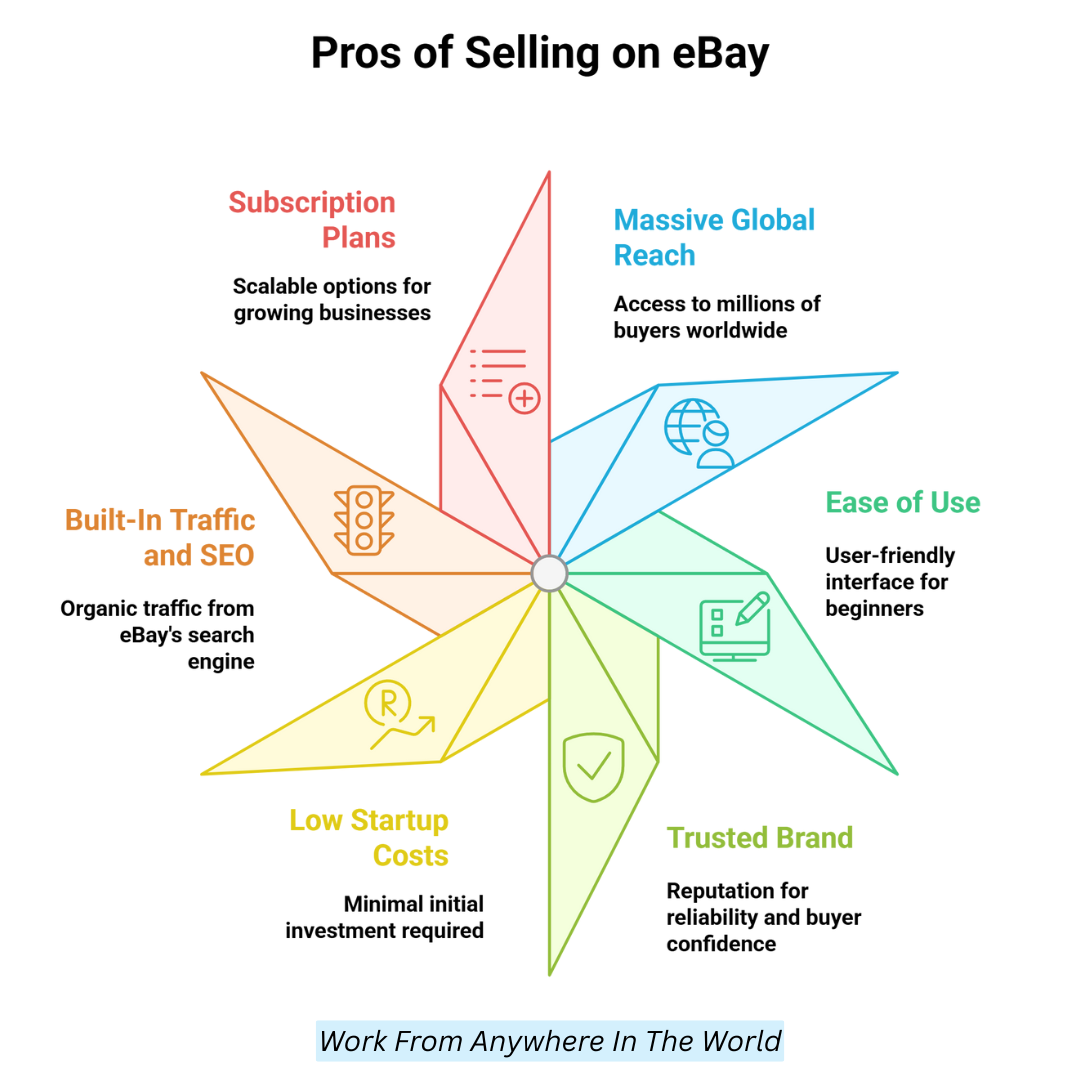
7. Mobile App And Seller Tools
eBay’s mobile app makes it incredibly convenient for sellers to manage their listings, respond to buyers, and process orders on the go.
The app includes barcode scanning, photo uploading, messaging, and real-time analytics. This mobile accessibility supports active sellers who need flexibility in managing their business operations.
Additionally, eBay offers seller tools like promoted listings, sales reports, shipping label generation, and integration with external platforms like PayPal, Shopify, or accounting software.
These features streamline logistics and help you operate more efficiently, whether you're a casual seller or a full-time eCommerce entrepreneur.
8. Extensive Product Categories
eBay supports a wide range of products—from vintage comic books to brand-new electronics. This diversity means nearly anything can be sold, provided it complies with eBay's policies.
Sellers aren't locked into a specific niche and can experiment with different product lines. You can sell refurbished goods, handmade items, wholesale inventory, or even digital products.
The platform’s flexibility is especially appealing to resellers, dropshippers, and liquidation specialists who thrive on variety. Whether you're testing new product categories or building a general store, eBay's inclusive marketplace gives you room to diversify.
9. Community And Educational Resources
eBay fosters a strong community of sellers, offering forums, webinars, and guides to help users improve their selling practices.
Whether you're learning how to optimize titles, handle returns, or ship internationally, eBay University and the Seller Center provide in-depth information.
The peer forums also allow sellers to exchange tips and strategies, solving problems together in real-time. This support network helps reduce the learning curve for new sellers and offers continued growth for experienced ones. It’s a collaborative environment that allows for elevated seller performance and business results.
10. Seller Protections
The most crucial elements for long-term success when assessing the advantages and disadvantages of selling on eBay are unquestionably its dispute resolution processes and seller protection laws.
eBay helps resolve disputes fairly and offers tools to report abusive buyer behaviour. Sellers with strong performance ratings may be eligible for perks like fee discounts, early dispute resolution, and more visibility in search results.
These policies provide a level of reassurance that not all platforms offer. Though some sellers critique eBay's enforcement, the system generally aims to create a balanced and trustworthy experience for both buyers and sellers, a crucial factor in sustaining long-term selling success.
11. Robust Analytics And Reporting
eBay provides performance metrics that help sellers analyze what’s working and what’s not. You can track listing views, sales conversion rates, average selling prices, and more.
These insights enable better decision-making regarding pricing, inventory, and marketing strategies. Sellers can also view buyer behaviour patterns and seasonal trends to plan inventory.
Advanced store subscribers get access to deeper insights, helping them optimize operations for greater efficiency. These analytics are particularly valuable for data-driven sellers who want to continually refine their strategy and stay competitive in a crowded marketplace.
12. Integration With Shipping Carriers And Tools
eBay integrates with major shipping carriers like USPS, UPS, and FedEx, allowing sellers to print shipping labels directly from their dashboard.
Discounted postage rates and bulk shipping options streamline logistics. Sellers also benefit from order management tools and automatic tracking updates that enhance the buyer experience.
Integration with shipping software like ShipStation or Pirate Ship provides even more automation, especially for high-volume sellers.
These features reduce manual effort, speed up fulfillment, and minimize errors—key factors in maintaining good seller ratings and positive customer feedback.
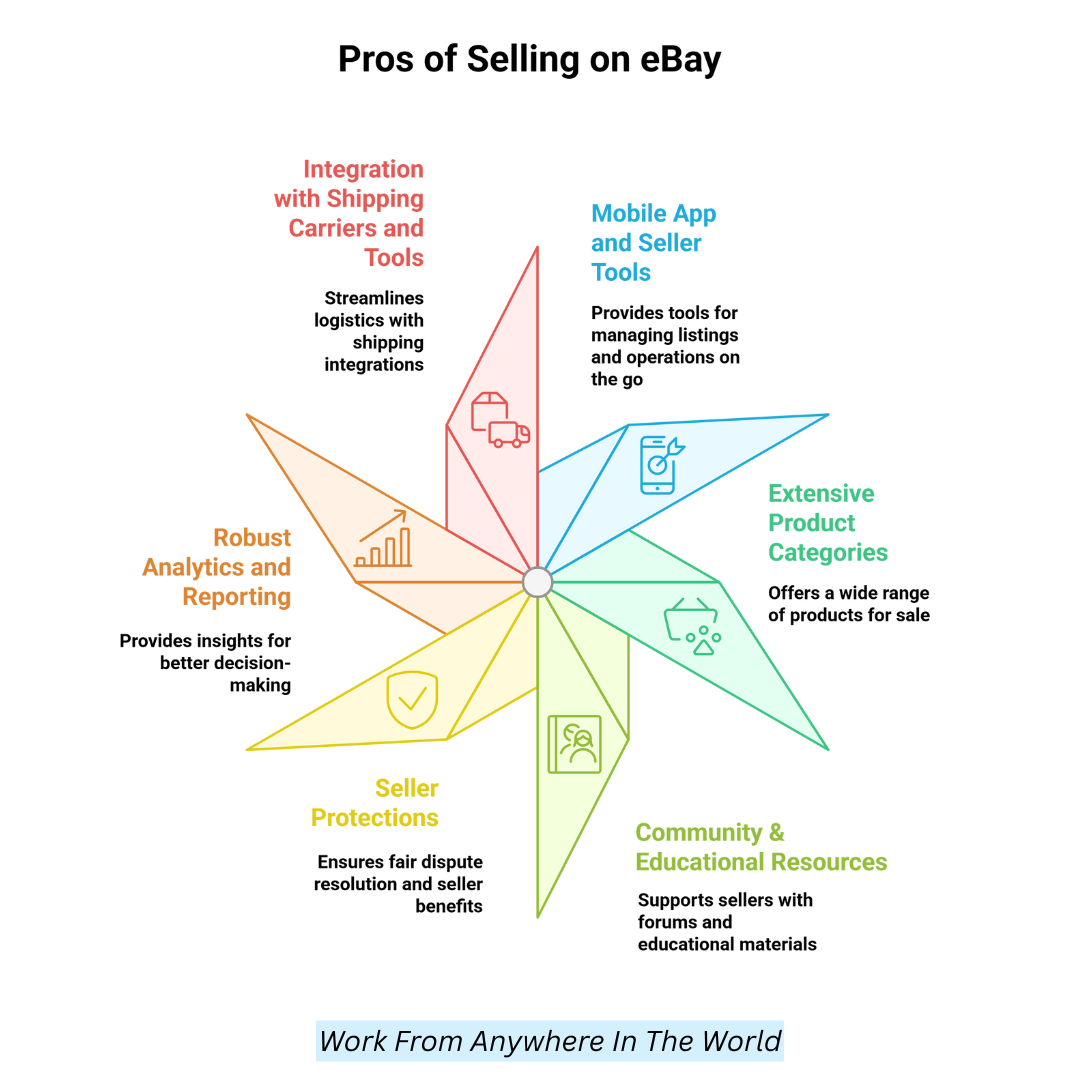
Cons Of Selling On eBay
1. High Fees For Some Categories
While eBay's startup costs are low, its fees can quickly add up. Final value fees, listing upgrades, PayPal charges (if used), and optional promotion fees can significantly cut into profits.
In competitive categories like electronics or fashion, where margins are already thin, these fees may make the platform less viable.
Sellers need to monitor their earnings closely and factor in all potential costs. For volume sellers or those operating on tight margins, this can be a substantial drawback that affects long-term profitability. Careful cost analysis is essential before scaling operations on eBay.
2. Strict Seller Policies
eBay enforces strict policies around shipping times, customer communication, return acceptance, and feedback management.
While these rules maintain buyer confidence, they can feel restrictive to sellers, especially smaller or part-time ones. Missed delivery deadlines, negative feedback, or delayed responses can impact your seller rating, reducing visibility or even resulting in account suspensions.
Unlike personal online stores, where sellers can set their own rules, eBay holds its sellers to a uniform standard. Those unable to meet these expectations regularly may find the platform punitive or overly controlling for their business model.
3. Buyer Fraud And Scams
Though relatively rare, scams and dishonest buyer behaviour do occur on eBay. Some buyers abuse the return policy by claiming items were defective or not as described, even when they're perfectly fine.
Others initiate chargebacks through PayPal or credit cards, causing sellers to lose both the product and the sale amount.
While eBay has dispute resolution systems, sellers may not always come out ahead, especially if they lack proper documentation.
This vulnerability can be stressful and financially damaging, particularly for smaller sellers who don't have the resources to absorb losses easily.
Wealthy Affiliate – Mini Review (2025)
If you’ve ever thought about turning your blog, passion, or niche into an online business,
Wealthy Affiliate (WA) is one of the most beginner-friendly platforms I’ve used.
It combines step-by-step training, website hosting, SEO research tools,
and an active community all in one place.
What I like most: you can start free (no credit card needed),
explore lessons, test the tools, and connect with other entrepreneurs
before upgrading. WA isn’t a “get rich quick” scheme — it’s a platform where success comes
from consistent effort and applying what you learn.
4. Highly Competitive Marketplace
Among the pros and cons of selling on eBay, intense competition and the pressure to lower prices can challenge profitability for new or small sellers.
Established sellers, large retailers, and international merchants often dominate search results with lower prices and bulk inventory.
New or small sellers can struggle to gain visibility without offering steep discounts or spending on promoted listings. This price-driven environment can lead to a “race to the bottom,” where sellers undercut each other to win sales at the expense of profitability.
Standing out on eBay requires not just great products, but also strategic listing optimization, branding, and marketing efforts that go beyond basic selling.
5. Negative Feedback System
eBay’s feedback system is designed to promote transparency, but it can sometimes feel harsh to sellers. A single negative review, whether justified or not, can affect your overall rating and discourage future buyers.
Unlike buyers, who can leave feedback without consequences, sellers are more restricted in their responses. Even if an issue is resolved, negative feedback often remains unless the buyer willingly removes it.
This can create an imbalanced dynamic where buyers have more leverage. Reputation matters deeply on eBay, and maintaining a perfect score requires vigilance and diplomacy in every transaction.
6. Limited Branding Opportunities
Selling on eBay restricts your capacity to create a distinctive brand identification, in contrast to establishing your own eCommerce business.
There aren't many ways to customize product pages to make your listings visually stand out, and they are all the same. While store subscriptions offer some features like custom banners and categories, they still pale in comparison to platforms like Shopify or Wix.
This makes it more challenging to use branding alone to create a devoted clientele or encourage repeat business. For entrepreneurs focused on brand development and customer retention, eBay may feel like a short-term solution rather than a long-term home.
7. Returns And Refund Hassles
eBay’s return policies heavily favour buyers. Many categories require sellers to accept returns, even on items that are not defective. In some cases, buyers return used or damaged goods while still receiving full refunds.
While these policies help build buyer confidence, they often place the burden on sellers. Processing returns, issuing refunds, and relisting items consume valuable time and resources.
Moreover, high return rates can negatively affect your seller rating. For businesses with slim margins or limited staff, managing returns can become a major operational headache that offsets the benefits of broader exposure.
8. Dependence On eBay's Algorithm
Much like Google, eBay operates on a proprietary algorithm (called Cassini) that determines listing visibility. Sellers must optimize titles, descriptions, pricing, and performance metrics to rank higher in search results.
However, the algorithm is often opaque and subject to change without notice. This dependency means your visibility—and thus sales—can fluctuate for reasons beyond your control.
A sudden drop in impressions or clicks can significantly hurt your business, especially if you rely solely on eBay for income. Diversifying platforms is wise to avoid being at the mercy of a single algorithm.
9. Shipping And Logistics Challenges
Sellers are responsible for timely shipping and accurate tracking, which can be challenging, especially when handling international orders.
Miscommunications with carriers, lost packages, or customs delays can result in poor buyer experiences and negative feedback. eBay requires estimated delivery times and penalizes sellers for late shipments.
For small businesses without automated shipping tools, handling logistics manually can be time-consuming and error-prone.
Mistakes in this area can damage seller ratings and customer trust. Sellers must be organized and proactive about fulfillment to meet eBay’s shipping standards consistently.
10. Lack Of Direct Customer Ownership
One of the key pros and cons of selling on eBay is that sellers don’t own customer relationships, making brand-building and remarketing more difficult.
eBay controls the communication channels, and direct marketing to buyers is restricted. Unlike independent stores where sellers can collect emails and build loyalty programs, eBay keeps buyer data to itself.
This limits your ability to remarket to past customers or build long-term relationships. Each sale is transactional, not relational.
Sellers must continually attract new buyers instead of nurturing repeat business. If you're building a brand with customer lifetime value in mind, this lack of ownership can be a significant limitation.
11. Marketplace Saturation In Popular Categories
While eBay allows you to sell almost anything, some categories, like electronics, fashion, and home goods, are oversaturated.
Competing with large retailers or overseas sellers (especially from China) offering rock-bottom prices and free shipping can be discouraging.
This intense saturation makes it hard for new or small sellers to rank well unless they invest heavily in promoted listings or accept thin profit margins.
Niche categories tend to fare better, but even then, standing out requires constant effort in optimizing listings, managing inventory, and maintaining a high seller rating.
12. Geographic Selling Limitations
Although eBay is international, not all sellers can ship worldwide due to cost, customs, or regulatory issues. Sellers located in countries with limited postal services or high shipping fees may find it harder to compete globally.
Additionally, some items may not be eligible for international shipping due to restrictions or prohibitions in certain countries. eBay's Global Shipping Program helps mitigate this, but not every seller qualifies or benefits from it.
These limitations can reduce your buyer pool and require strategic planning to target regions where your shipping is efficient and competitive.
13. Frequent Policy And Algorithm Changes
Like many tech platforms, eBay frequently updates its policies, algorithms, and fee structures. Sellers must stay informed and adapt quickly to avoid penalties or drops in visibility.
What works today may not work tomorrow. These constant changes can be frustrating for sellers who prefer stability and predictability in their operations.
A minor algorithm update can affect search rankings, while a policy tweak might change how you handle returns or shipping times.
This lack of consistency can hinder long-term planning, especially for sellers who depend on eBay as their primary income source.
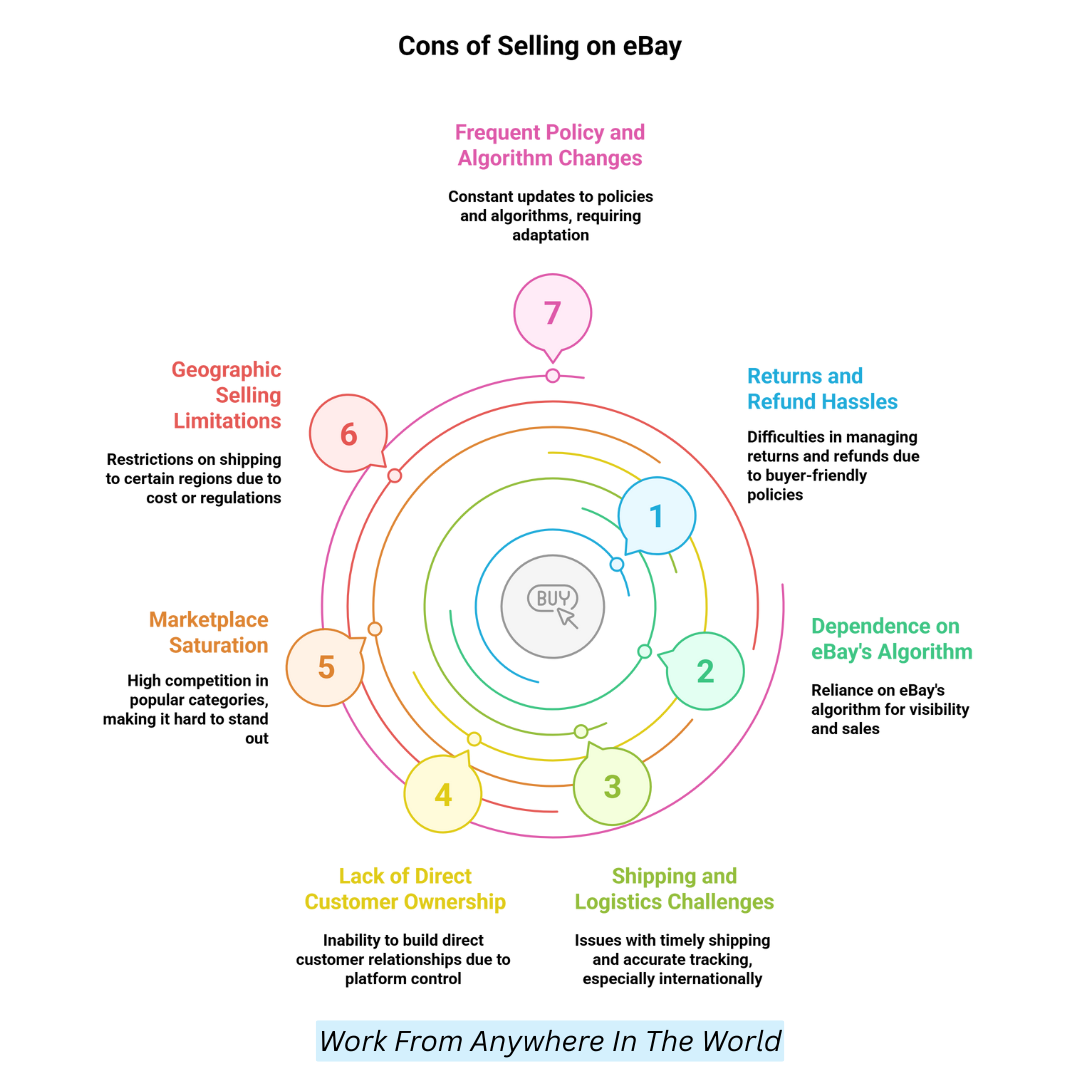
Conclusion
Access to a large customer base and a variety of selling possibilities make selling on eBay a lucrative experience. However, it also involves fees, competition, and policy challenges.
Making educated judgments that support your professional or personal objectives can be achieved by balancing the benefits and drawbacks of selling on eBay.
Whether you're a beginner or a seasoned seller, success comes from strategy, consistency, and understanding the platform.
I trust you enjoyed this article on the Pros and Cons of Selling on eBay. Please stay tuned for more insightful blogs on affiliate marketing, online business, and working from anywhere in the world.
Take care!
— JeannetteZ
💬 Your Opinion Is Important To Me
Do you have thoughts, ideas, or questions? I’d love to hear from you. Please leave your comments below or email me directly at Jeannette@WorkFromAnywhereInTheWorld.com.
📚 More Work From Anywhere Reads
🚀 Ready to Build a Business You Can Run from Home
or from Anywhere in the World?
Imagine creating income on your terms — from home, a cozy café, or wherever life takes you.
With the right tools, training, and community support, it’s entirely possible.
Start your own online business for free — no credit card needed.
Disclosure
This post may contain affiliate links. As an Amazon Associate and participant in other affiliate programs, I earn from qualifying purchases at no extra cost to you. Please read my full affiliate disclosure.

